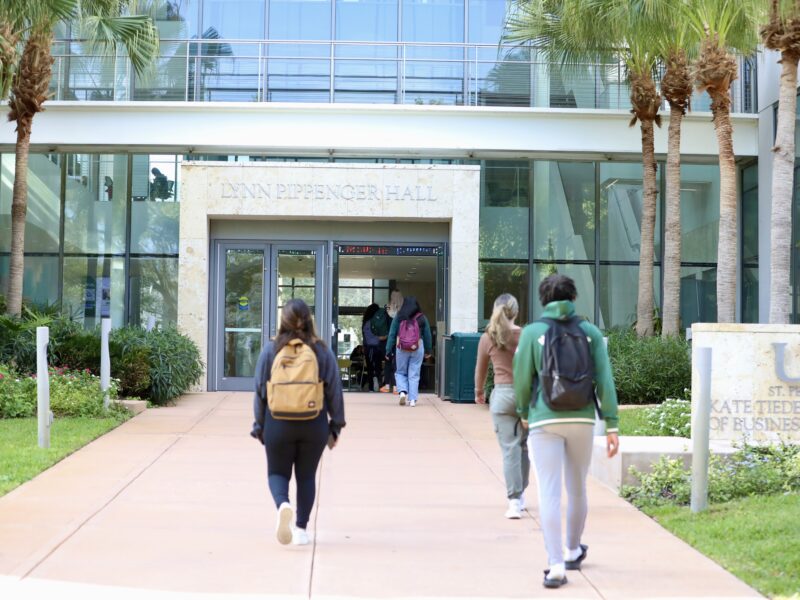Jordan Palavra, president of USF St. Petersburg’s Black Student Association, slouched in his chair at the front of the room. The 19-year-old’s mouth formed a thin, nervous-looking line as he tells the one person in attendance they might be alone for this week’s discussion.
The group’s latest success was a forum about twerking, a popular yet provocative dance move, and the negative appropriations it implicates toward black women. Palavra said it was their biggest turnout yet.
On Jan. 30, however, the topic of the day # interracial couples # garnered less interest.
By 5 p.m., the meeting had not commenced. Two people wandered in, and one left after realizing she was in the wrong room. It was doomed to be a two-way conversation # until four students entered at 5:15.
“Is anyone else coming?” Palavra asked. He listed a few names, but heads shook no in response.
So Palavra dove right into the day’s discussion.
“Who here has ever dated someone from a different race?” he asks.
There was no immediate response. Two or three raised their hands, some turned to each other in conversation with furrowed brows. Then, freshman Keonna Gilmore quieted the group with her clear voice.
“It’s complicated for us,” she said. A few nod in agreement.
“What do you mean?” Palavra asked her.
“Someone asked me if I could date outside my race,” Gilmore said. “I’m mixed.”
Gilmore explained she can’t associate with only one race, because one of her parents is white and the other is black. She said pressures to “choose” or “pick” a single race association would force her to abandon half of her identity.
Since she was a child, Gilmore attended predominantly white schools. She recalls an African-American boy telling her on the school bus she wasn’t black.
“He pointed at my skin, and he said, ‘You aren’t black, you’re like her,’ and he pointed to a white girl. [Mixed children] are forced to see both perspectives of race. You’re either not black enough or you aren’t white enough. It really takes a toll on you,” Gilmore said.
Her voice tightened as she told the group that her grandfather refused to see her for the first five months of her life. Though he spoiled her since they met, his negative perception of her parents’ marriage was never discussed.
“My peers even tell me all the time, I should date a black guy. In the black community, it seems like a lot of people get angry when a black girl is with a white guy, or the other way around,” Gilmore added. “They say you should stick within your race. It’s a stereotype.”
Using Gilmore’s example, Palavra explained the importance of educating others. It’s about ending ignorance, he told the group.
“I asked someone recently to come to one of our meetings, and they told me that they don’t identify with black culture,” Palavra said. “I feel like people see ‘black’ in the front of the name and think we’re all about Black Power, and it holds such negativity for a lot of people.”
The Caribbean Cultural Exchange, a club formed just last spring, has 49 members and more than 100 people on its email list. In contrast, BSA lacks adequate membership for a full executive board, though it has existed since 2011. Palavra believes the issue comes primarily from minorities on campus not participating.
“There’s not a lot of people of color on campus, and if they don’t care, how can we make other cultures care?”
According to the University of South Florida’s 2013 diversity profile, 4 percent of students identified as Asian, 7 percent as African-American and 14 percent as Hispanic. The remaining 71 percent are white.
But behind these percentages are individuals with the power to participate.
Out of 184 Asian students, 338 African-American students, 636 Hispanic students and 3,315 white students, there are less than 10 students consistently associating with, and attending, BSA on a weekly basis.
Founder of the Caribbean Cultural Exchange Nia Joseph, 18, said the USFSP Office of Multicultural Affairs has initiated a council that involves each multicultural group on campus. The council plans to coordinate events that involve multiple groups, Joseph explained.
In the past, BSA has put on Bring It Back Bash, where there is music, dancing and food in a semi-casual setting. This year’s bash is set for March 21.
Palavra wants students to know “BSA is a club that accepts every creed and color.”
“All we want to do is educate each other about our differences,” he said. “It’s time that we as people embrace other cultures and see them for what they really are, not what someone else deemed them to be.”
Get involved: The Black Student Association meets at 5 p.m. on Thursdays in SLC 2101. For more information contact Jordan Palavra at palavra@mail.usf.edu.
news@crowsneststpete.com


